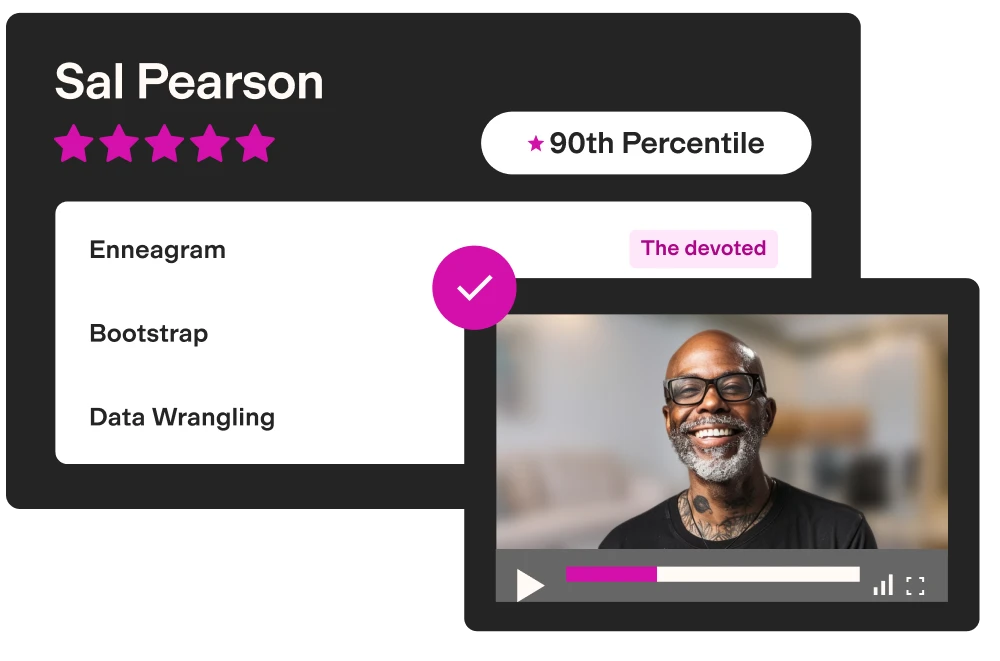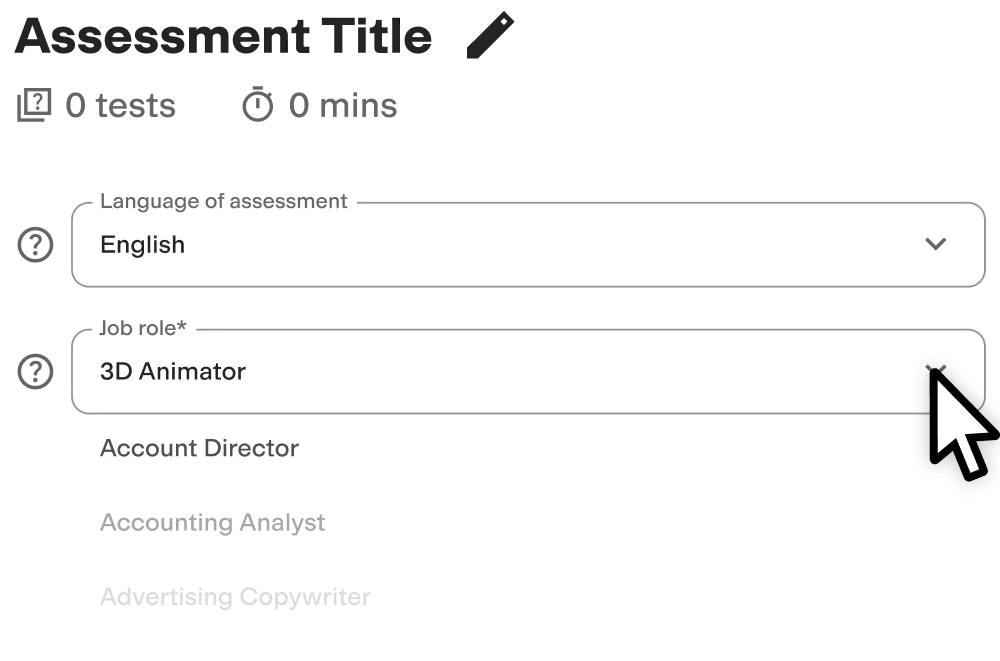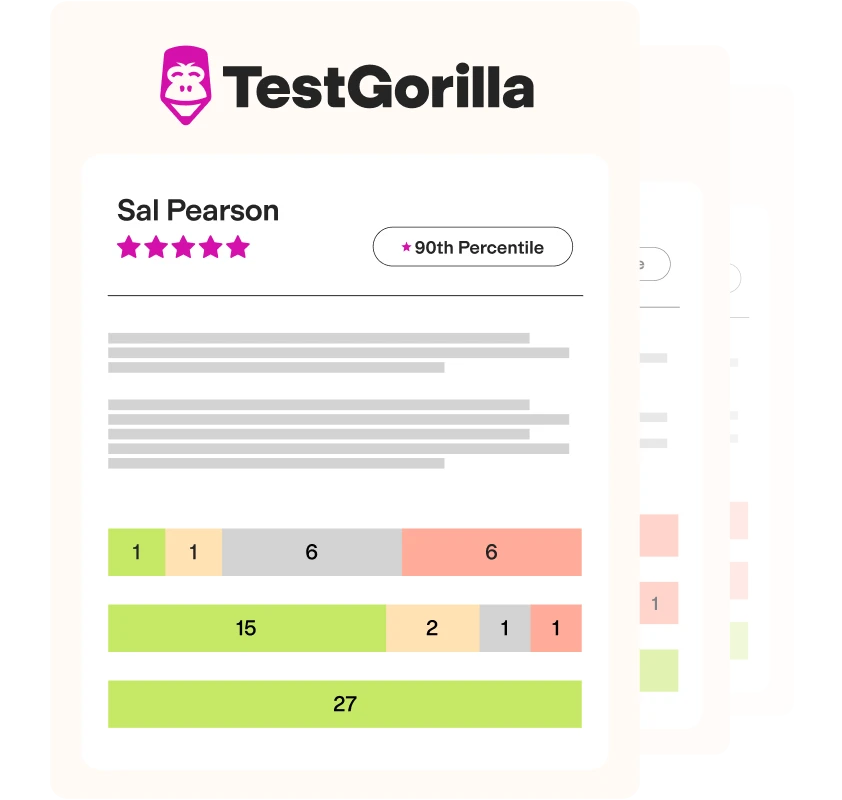German B1 (Intermediate) test
Summary of the German B1 (Intermediate) test
The German B1 (Intermediate) test evaluates a candidate’s German proficiency at the B1 level of the CEFR framework. This test will help you hire employees who can communicate in German on subjects commonly encountered at work and in everyday life.
Covered skills
Basic grammar
Sentence composition
Reading comprehension
Listening comprehension
Use the German B1 (Intermediate) test to hire
Customer support agents, sales representatives, and other employees who need an intermediate level of German to perform well in their roles.
About the German B1 (Intermediate) test
Employees with the ability to communicate in German at the intermediate level will help improve your company’s internal and external communications by removing language barriers and improving the flow of information and collaboration among colleagues and to and from customers.
The German B1 (Intermediate) test evaluates a candidate’s ability to communicate at the B1 level of the Common European Framework of Reference (CEFR) for Languages. The test evaluates candidates in the areas of grammar and vocabulary, sentence composition, reading comprehension, and listening comprehension.
Employees who can speak the German language at an intermediate level can communicate with customers, colleagues, and other stakeholders comfortably around daily situations that can arise in the workplace.
The texts and sentences used in the test mimic real-life situations at work and in everyday life. Those who score well on this test will be able to understand simple, connected sentences on topics that are generally familiar.
The test is made by a subject-matter expert
TestGorilla’s tests are created by subject matter experts. We assess potential subject-matter experts based on their knowledge, ability, and reputation.Before being published, each test is peer-reviewed by another expert, then calibrated using hundreds of test takers with relevant experience in the subject.
Our feedback mechanisms and unique algorithms allow our subject-matter experts to constantly improve their tests.
Josef R.
Josef Rimensberger doesn’t just want to teach the German language; he wants to make it accessible to learners of all ages and abilities. Josef uses his training in Special Education to create specialized courses that open up the German language to students of all levels.
A German-language teacher and translator for over fifteen years, he loves learning from his students as much as he enjoys teaching them. Josef is currently studying IT and plans to create a website for his teaching.
Use TestGorilla to hire the best faster, easier and bias-free
Our screening tests identify the best candidates and make your hiring decisions faster, easier, and bias-free.
Create high-quality assessments, fast
Building assessments is a breeze with TestGorilla. Get started with these simple steps.
What is a German B1 (Intermediate) test?
A German B1 test will help you identify candidates with intermediate-level (B1) German language skills. B1 is one of the language skill levels defined by the Common European Framework of Reference for Languages (CEFR), an international standard for describing language ability. Here’s a brief outline of the framework:
• A1 (Beginner): Can use and understand everyday expressions and basic phrases, like introductions, if spoken slowly and clearly.
• A2 (Elementary): Can understand immediately relevant expressions and vocabulary, like information about family, directions, or local geography, and are able to express things in simple terms.
• B1 (Intermediate): Easily grasps the main points of common interactions related to work, school, and leisure. Can explain and describe things clearly, though mistakes may still be made.
• B2 (Upper-Intermediate): Understands core ideas from complex text and spoken expressions, though fields of vocabulary might be specialized. Can interact with native speakers without strain.
• C1 (Advanced): Has achieved operational proficiency. Can understand subtleties and complexities and have challenging discussions with native speakers on any topic.
• C2 (Mastery): Can be considered equivalent to a native speaker.
Each CEFR level considers competencies in reading, writing, speaking, and listening. The B1 German test measures these four areas of language proficiency to help you identify candidates with intermediate German-language abilities.
• Reading: How well can your candidates understand written German text?
• Writing: How well can your candidates express themselves in written German?
• Speaking: How well can your candidates express themselves in spoken German?
• Listening: How well can your candidates understand spoken German?
How can I use the German B1 (Intermediate) test?
With remote work on the rise, the demand for language skills is increasing across all industries.
German is the 11th most widely spoken language in the world, with more than 130 million speakers, and is used extensively in tech and business. But it’s difficult for employers to know if job candidates have the necessary German language skills for an open role just by looking at their CVs.
Using a German B1 test is the most accurate and reliable way to measure intermediate German language skills.
How does the test work?
Candidates are given ten minutes to complete the test. The questions cover basic grammar, vocabulary and spelling, reading comprehension, and listening comprehension skills in German. Applicants who do well on the test have an intermediate level of proficiency in these skills.
It’s important to use the German B1 test in combination with other skills tests – not in isolation.
You can build a complete pre-employment assessment with up to five skills tests from TestGorilla’s test library. You’re also able to add custom questions to tailor the assessment to the role you’re advertising.
Combine language tests with role-specific skills tests, cognitive ability tests, or coding tests, depending on the role you want your German-speaking candidate to fill.
Once you’ve built a complete assessment that includes the B1 German test, you can send it to candidates via a public link (a URL that you can copy to a chosen job board or personal email) or enter the names and email addresses of your candidates to generate an automated assessment invitation.
How do I analyze the test results?
TestGorilla provides a variety of tools to help you review your candidates’ results and create a shortlist of candidates to interview.
You’ll see a general overview of all candidates who have taken your assessment, ranked from highest to lowest percentile scores, on the “My assessments” page. Percentile scores are generated based on the results of all the candidates in our database who have taken the tests in your assessment.
You can use the percentile scores to see your top candidates at a glance or choose to analyze them in even more depth:
• Organize candidates by name, average score, or your ratings of their custom question responses.
• Filter by Stage (evaluated, not yet evaluated, invited for interview, interviewed, rejected, offer sent, hired) and/or Status (invited, started, completed, disqualified).
• Change the scoring benchmark to see how your candidates have scored relative to other candidates who have taken the same test. This way, you can assess test performance even if you only have one candidate.
Our German B1 (Intermediate) test will help you hire top German-speaking candidates
With a German B1 test, measuring language skills becomes simple. You don’t need to guess or wait until the interview stage to gauge an applicant’s abilities.
Use TestGorilla’s B1 German test to effectively identify language skills at the start of the hiring process, and you’ll spend less time and effort looking for the right candidate.
Some other benefits of using online assessments such as the B1 German test for skills-based hiring include:
• Bias-free hiring: CV screening focuses on education and experience, so it’s vulnerable to recruitment bias. Skills tests put candidates on a level playing field.
• A comprehensive evaluation: Use a combination of skills tests to measure cognitive ability, culture-add potential, technical skills, and language skills.
• A scalable solution: Whether you have 20 applicants or 200, you can send an assessment to all of them with one click and view a breakdown of the results to easily compare candidates.
• Avoid mis-hires: Mis-hires are costly for businesses. Skills assessment results are a better indicator of job success than CVs and will give you the best chance of making the right hire.
If your company consistently hires for German language skills, then rest assured that you can use this test again and again. Questions in the B1 German test are shuffled every time you build and send out a new assessment. Additionally, our subject-matter experts use feedback mechanisms and unique algorithms to constantly improve the test.
In summary
If you’re looking to hire a candidate with B1 (Intermediate) German-speaking skills, you should use this test to assess your applicants before inviting the most qualified people to an interview. Use our German B1 test to reduce time-to-hire and recruitment bias by making data-driven decisions.
FAQs
View a sample report
The German B1 (Intermediate) test will be included in a PDF report along with the other tests from your assessment. You can easily download and share this report with colleagues and candidates.







